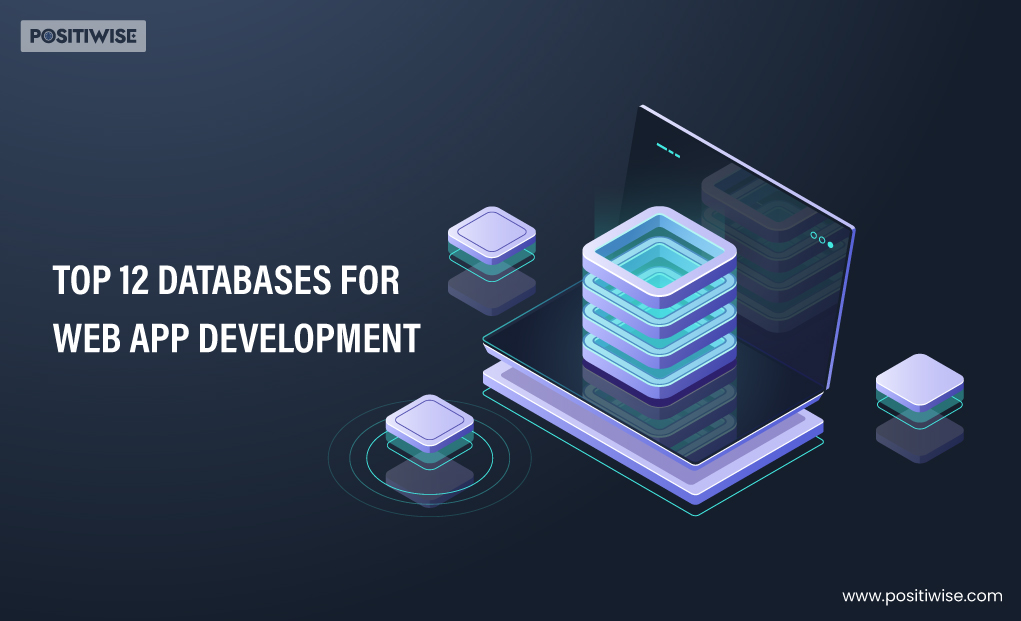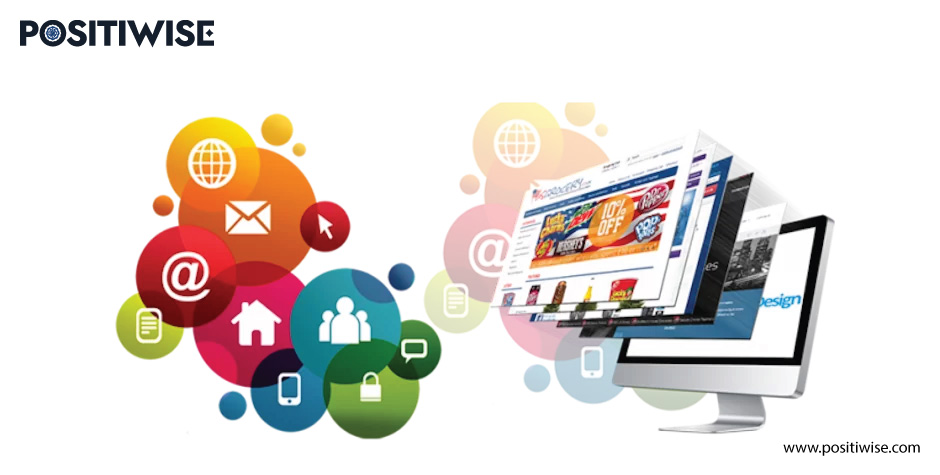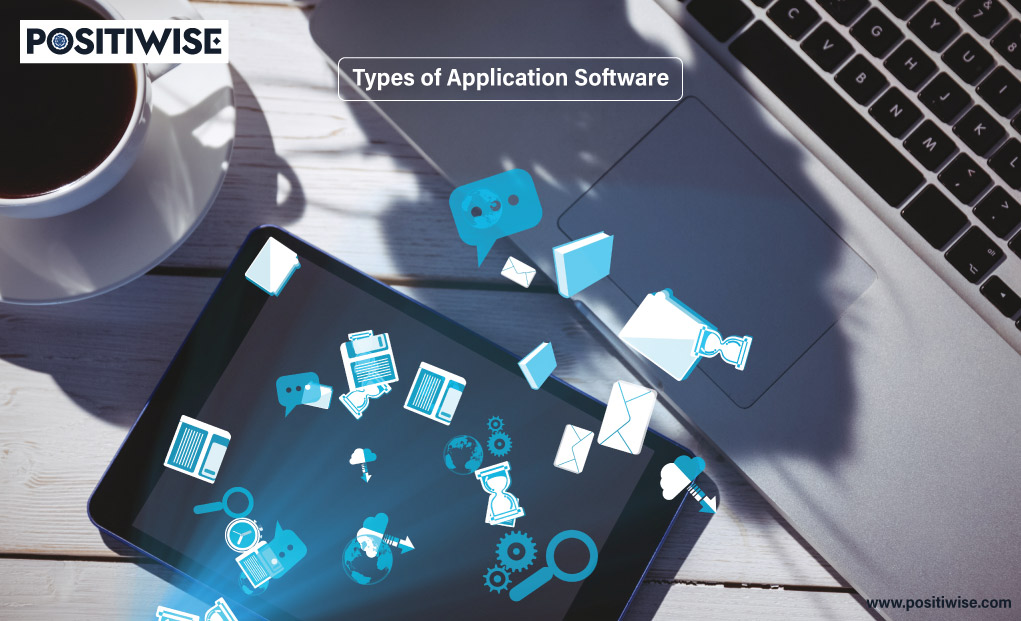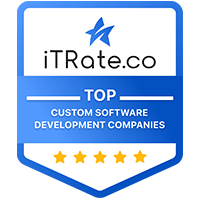Quick Overview:
A database is a must for web applications to store, handle, and manage data properly. It helps the application components to efficiently retrieve the correct data, process it, and provide an accurate output to end-users. In addition, it also aids in enhancing the performance, speed, security, and scalability of software. But all this can only happen if you choose a reliable and updated database. In this blog, you will find the top six databases in 2024 that industry professionals recommend. As a result, you will know the best database management software for web app development.
Introduction
Databases are a necessity of every web application, as without them, you cannot store any company, user, transaction, or other data. But, in the digital world, where scalability, security, and reliability are top concerns, selecting an authentic database can be hectic.
But you don’t need to fret; we have analyzed all databases and listed your top six. By the end of this blog, you will know the best database for web applications.
Database Management Software: A Quick Overview
Database management software helps store, process, and maintain different datasets. You can consider it as software that helps easily manage the data collected from multiple sources. Mainly, databases get configured on servers, and a query language gets used to develop its logic per project requirements.
You can find numerous databases available that can integrate with your web application. And in a further section, we are going to discuss the top six among them.
What To Look for In a Database Management System Software
Whenever you have to select the best database software, you must consider the following points:
- Check the database compliance with industry standards.
- Validate the built-in security controls of the database management system.
- Ensure that the database can easily scale up without any additional heavy infrastructure.
- Confirm whether the database is NoSQL, relational, cloud-based, object-oriented, or other.
- Check the performance and query patterns.
- Research the availability of resources to manage databases in the long run.
- Find out about the database configuration and maintenance cost.
After undergoing and completing each point listed above, you can find a top-notch database for your web application.
Most Popular 12 Databases for Web Applications to Consider in 2024
In 2024, every firm wants its web application to process and secure data accurately. And if you also want to fulfill such metrics for your web app, the below-listed databases are the most reliable.
- MySQL
- Microsoft SQL Server
- Oracle Database
- PostgreSQL
- MongoDB
- Apache Cassandra
- IBM DB2
- Elastic Search
- Neo4j
- Firebird SQL
- Redis
- MariaDB
#1 MySQL

MySQL is one of the most popular and well-founded databases for web applications. Every web app developer knows the MySQL configuration or has comprehensive knowledge of configuring it. In addition, according to statista.com, MySQL ranks in the top five databases per a survey conducted in the first quarter of 2024.

For MySQL database, structured query language gets used, which leverages to connect it with any web and mobile application. Also, you can utilize it for providing PaaS (Platform-as-a-Service), SaaS (Software-as-a-Service), and DBaaS (Database-as-a-Service) services to your customers and stakeholders.
Additionally, it offers a cross-platform compatibility advantage, enabling it to run on Windows, Linux, and macOS machines. Some of its primary features also include:
- MySQL provides ACID (Atomicity, Consistency, Isolation, Durability) functionality.
- As it’s a relational database, the performance and loading speed are high in every situation.
- It can be used with any web application development technology, such as .NET, PHP, JavaScript, and more.
- It’s available in different versions per your requirements, such as MySQL Heatwave, which provides fully managed services with real-time analysis.
- It ensures that data is secured and its integrity and confidentiality is maintained.
#2 Microsoft SQL Server
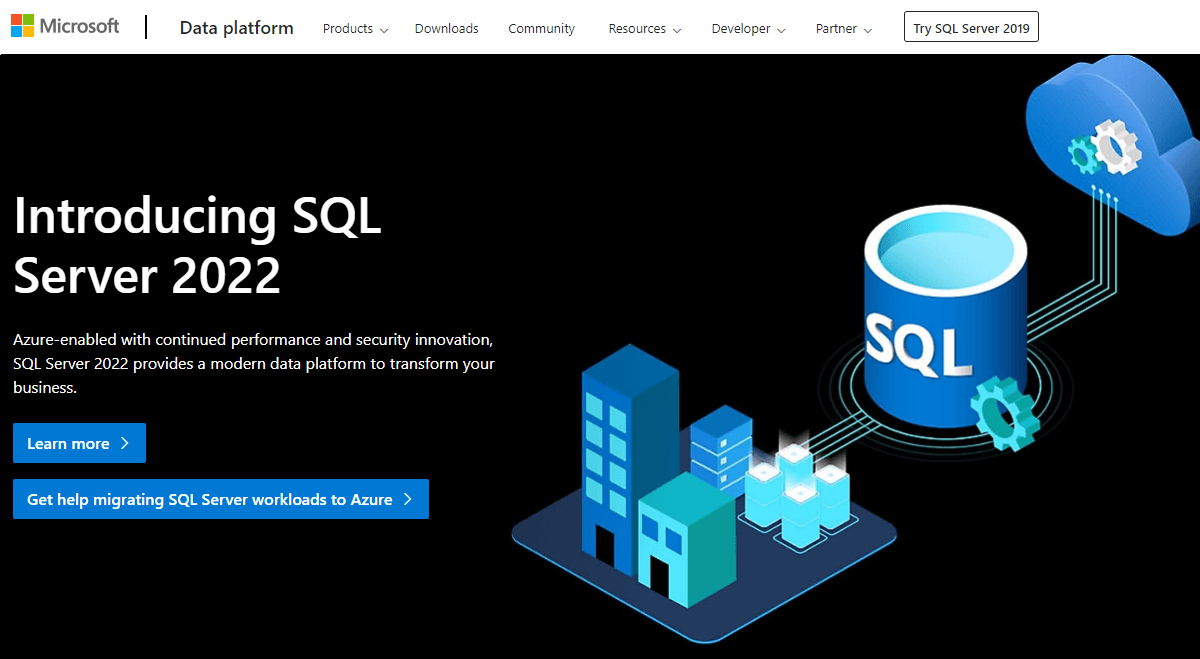
Microsoft SQL server is another relational database management software, and it’s also in the top five 2024 most used databases list. Primarily, it gets used for large enterprise-level applications built using Microsoft-developed technologies, such as .NET, ASP.NET, .NET Core, and more. But you can configure it with another tech stack, too.
The Microsoft SQL server is a reliable choice for web app development professionals due to its easy scalability, tight security, and low-cost maintenance. Moreover, it offers several built-in features, including data protection, classification, alerts for misconfiguration, and data monitoring.
Further, the top features that make Microsoft SQL servers so popular are as follows:
- Built-in analysis services, enabling the creation and management of OLAP (online analytical processing)
- It provides leverage to move, copy, and transform data.
- It provides master data services that help to handle every domain, including customers, products, and accounts.
- It helps to extend Microsoft Azure services to optimize performance and lower development and maintenance costs.
#3 Oracle Database
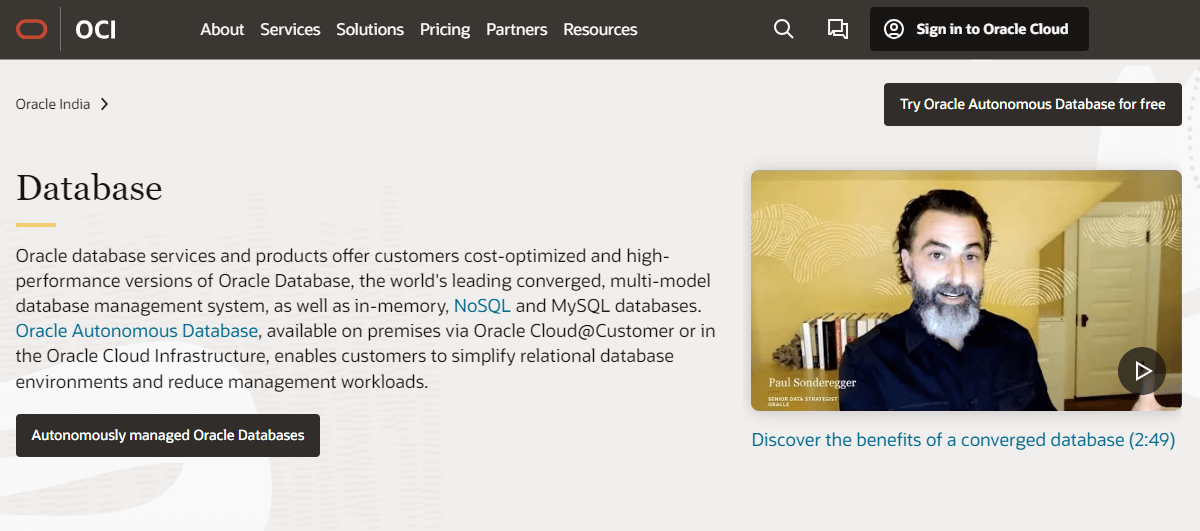
Oracle database is quite popular among enterprises and government agencies due to its extreme scalability, easy management, and solid security. Also, it’s a commercial database management system that gets used for two primary purposes:
- OLTP (Online Transaction Processing)
- Data Warehousing
In addition, Oracle database also offers multi-model relation DBMS functionalities, leveraging multi-workload improvement. Moreover, it enhances data handling with AutoML integration, which also helps in better decision-making. Also, its real application clusters are an added advantage for its users, as it provides:
- Effortless scaling of database across instances.
- Efficient load balancing.
- Maximum data availability, redundancy, and flexibility to boost processing.
Furthermore, you can also avail of the following benefits by selecting Oracle database in 2024:
- It provides a built-in recovery manager (RMAN) that helps restore crash data.
- It enables the user to perform procedural programming by installing a PL/SQL extension.
- You can configure multiple Oracle instances on a single server.
- It utilizes minimal resources and helps to save costs.
#4 PostgreSQL

PostgreSQL, or Postgres, is a renowned database in the web application development domain. You can freely download and configure it due to its open-source license. The PostgreSQL database mainly extends the Structured Query Language (SQL) but more efficiently. In addition, it is considered completely safe and provides a high probability of maintaining data integrity.
Further, it also allows you to create your own functions and data types per your requirements. Thus, the app logic will run smoothly, and it will be easy for administrators to understand the working and manage the software.
Additionally, the Postgres database also offers the following benefits:
- You can use multiple programming languages for your app, and the database will function efficiently without recompilation.
- It provides built-in disaster recovery features, such as PITR (Point-in-time recovery).
- It aids with, by default, available authentication mechanisms, including LDAP, SSPI, SCRAM-SHA-256, GSSAPI, and more.
- It supports international characters and provides full-text search.
#5 MongoDB

MongoDB is another database system listed in the top 10 must-use databases in 2024. Mostly, it gets used for large web database applications that need to process a high volume of data. Also, it’s different from all other databases listed in this blog, as it’s a NoSQL database, and others are relational databases.
In addition to the technology advancement, a cloud-based MongoDB version is also available. You can deploy it using AWS SDK, Microsoft Azure, or any other cloud infrastructure of your choice. Moreover, you can use it as a multi-cloud database and access its end-to-end encryption, automated scaling of resources, and compatibility with all programming languages.
Besides, the pros of choosing MongoDB include the following:
- It ensures maximum availability of data across users.
- The flexibility of MongoDB provides high performance and speed.
- You can run it on multiple servers, which ensures redundancy during server crashes and energy failures.
- It enables seamless implementation of hierarchical relationships, arrays, and other data structures.
#6 Apache Cassandra
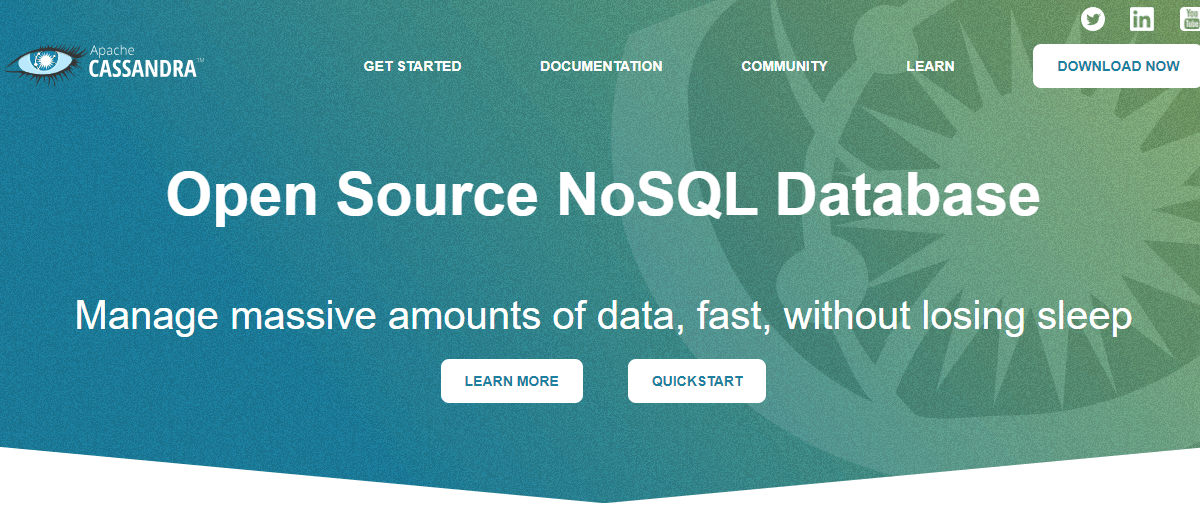
Apache Cassandra is also a NoSQL database with a distributed infrastructure advantage. Several large enterprises use it due to its high extensibility and availability. Cassandra’s fault tolerance is one of the primary features that make it one of the top six best databases to use for web applications.
If you need to develop a mission-critical application, such as a security system, to analyze real-time logs and react, then Cassandra should be your choice. In addition, it offers automated data replication and utmost stability even during thousands of requests sent simultaneously.
Moreover, by choosing Apache Cassandra, you can take benefit of the below-provided pros:
- It offers the option to select among asynchronous and synchronous replications for every update.
- It retains data availability even during regional outages.
- It ensures that you don’t lose any bit on cloud or on-premises infrastructure.
- It guarantees zero bottlenecks and accurate output to users.
- Its highly flexible architecture allows the addition of new machines with zero downtime.
#7 IBM DB2
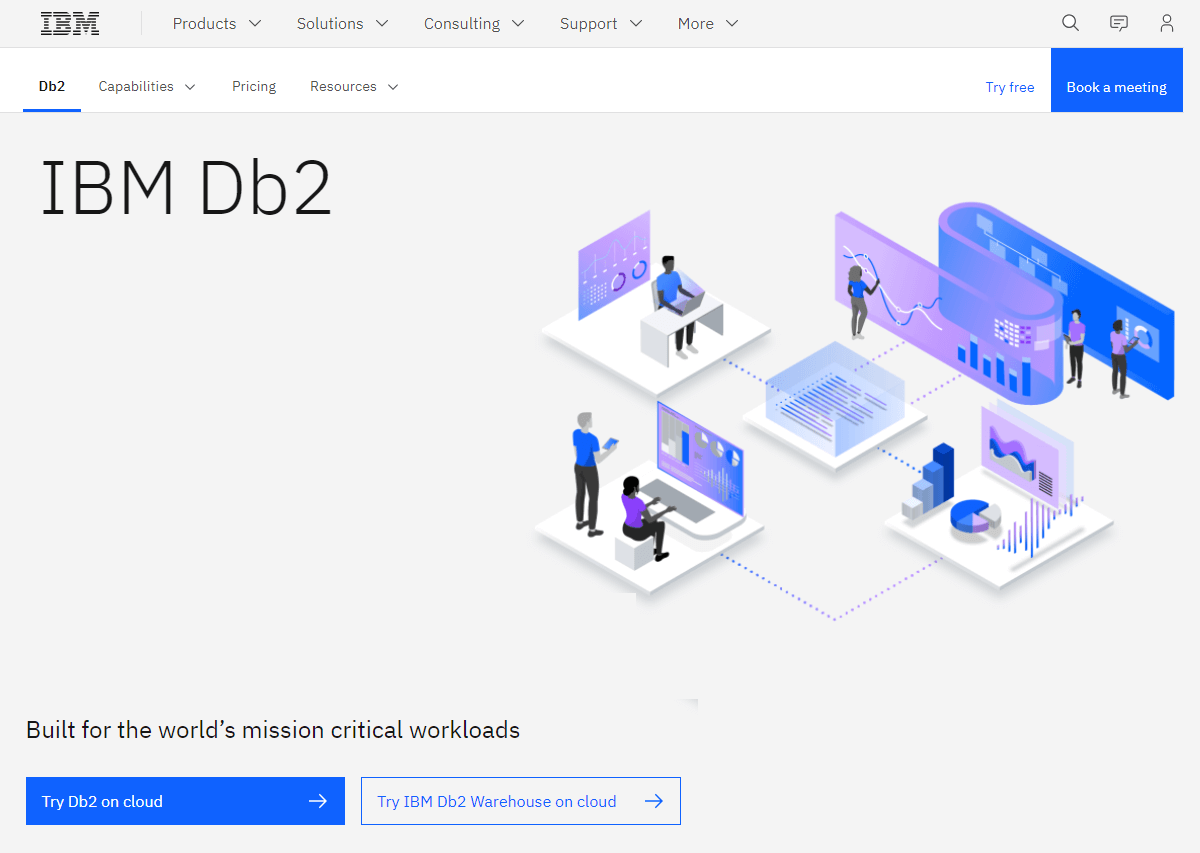
The IBM DB2 is an advanced cloud-native database developed primarily for real-time and low-latency applications. You can use it on any operating system, including Linux, Windows, and Unix. Most of professionals consider it due to enormous speed and support for non-relational and object-relational features.
In addition, IBM ensures that by using this database, you can maximize the data availability and integrity along with exponential scalability. Also, it helps in reducing the real-time notification time by 90%. Therefore, if we receive a notification in 100 seconds, with IBM BD2, the time can be reduced to 10 to 20 seconds.
Additionally, the IBM DB2 also provides:
- It provides built-in security to support mission-critical applications efficiently.
- You can utilize it for training Artificial Intelligence and machine learning models.
- It provides encryption, data masking, and access controls to protect data in the cloud.
- It aids in reducing development and maintenance with OLTP and OLAP.
#8 Elastic Search
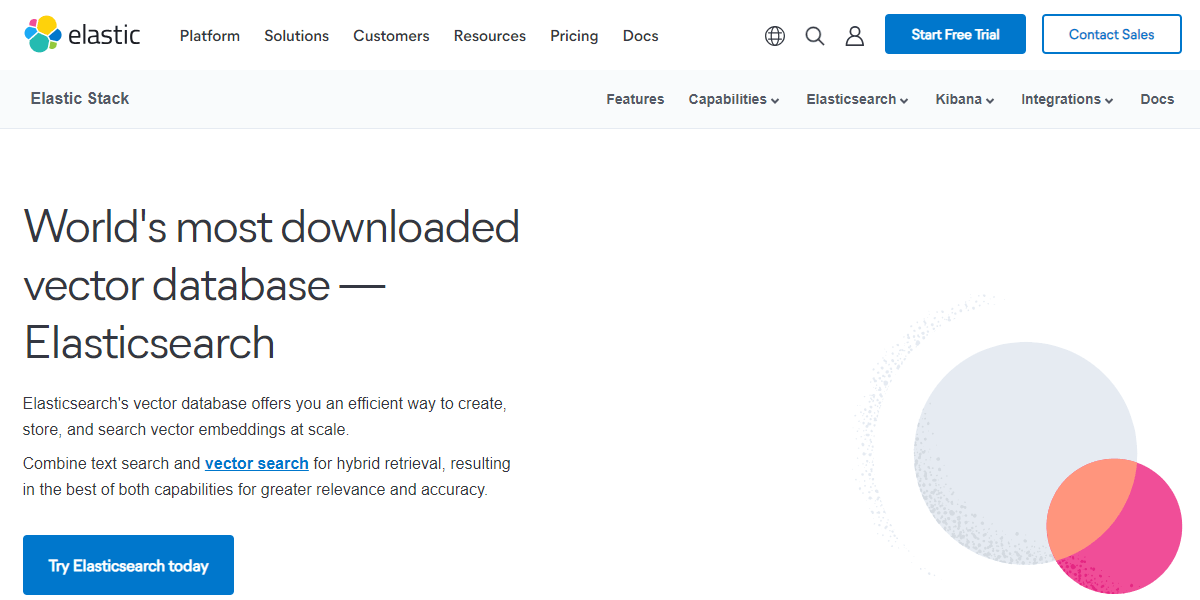
When speed and relevancy are the two primary requirements, Elastic Search gets listed in the top databases for custom web application development. Mainly, developers utilize it for new-age apps powered with AI capabilities to handle extensive user data in current and upcoming times. In addition, it can seamlessly connect with external LLMs (Large Language Models).
You can find many popular and Fortune 500 companies using elastic search, including CRED, Udemy, Shopify, Slack, Uber, and more. You can also combine the user searches with it, such as structured, metric, geo, and unstructured. Also, it leverages to explore data patterns for improved analysis.
Following are the top features and benefits of elastic search, which makes it stand out from other databases:
- It always retains the top speed, regardless of data size and type.
- It can store geo and numeric data using BKD trees.
- You can use it for MVP as well as complete application products.
- It can accurately handle kajillions of queries and events.
- It automatically detects failures and executes relevant operations to maintain data availability.
#9 Neo4j
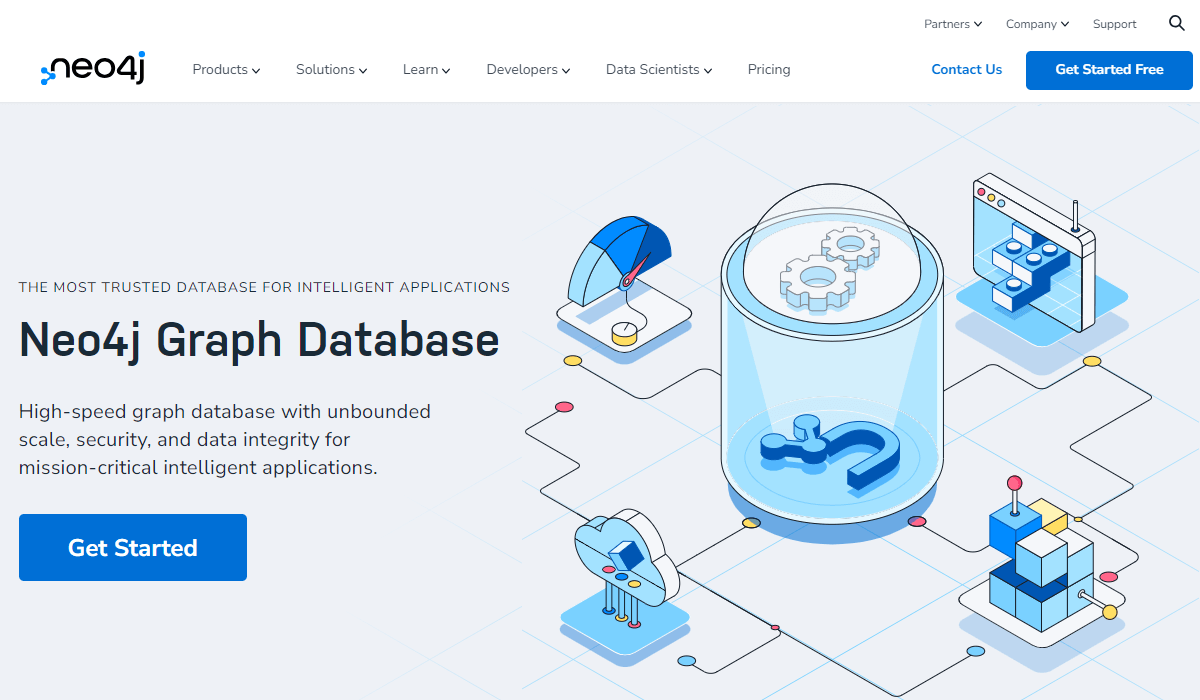
Neo4j is a reliable database for your web application if you want to use a graph database. The main difference between Neo4j and other databases is the storage format. Instead of documents and tables, it stores the data in the format of nodes and relationships. This feature of Neo4j makes it extremely flexible, as there’s no fixed defined structure.
Many global brands, such as Adobe, Airbus, Nasa, Vanguard, Intel, and more, use Neo4j. It eliminates all the constraints, enabling the execution of operations associated with machine learning, data science, visualization, cyber-security, and analytics.
The additional pros of using Neo4j are as follows:
- It supports ACID and UNIQUE.
- You can use indexes with it if you hold an Apache License
- It offers a user interface to execute SQL commands
- It scales horizontally to support extensive throughputs and large datasets.
- You can integrate with real-time applications to provide timely and accurate output to users.
#10 Firebird SQL
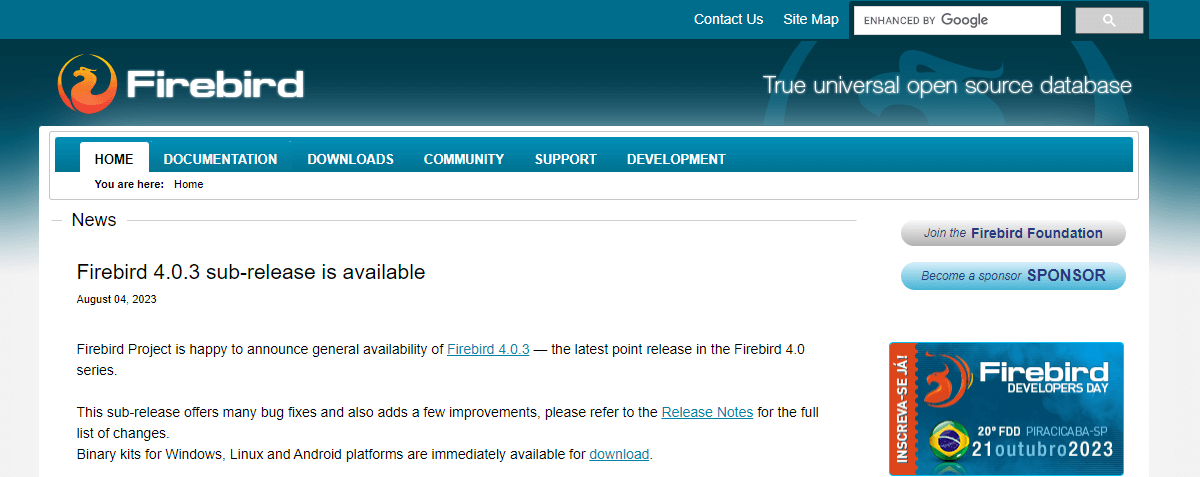
As the name defines, Firebird is a SQL-based database with an open-source architecture. You can configure it using any operating system, including macOS, Windows, Linux distributions, and Unix. Primarily, the base of Firebird SQL is Interbase, but the entire code is developed from scratch.
It’s the best database for web applications, targeting users across multiple platforms. Also, you can save money and time with Firebird, as it can run on different platforms with a single configuration. In addition, it ensures top-tier concurrency, enormous speed, and data availability in high-traffic hours.
The top features of Firebird SQL include:
- It supports multiple languages.
- It’s available for free, helping to save money during development and maintenance.
- It’s a cross-platform compatible database.
- The availability and concurrency of the database are high.
- You get integrated security features.
#11 Redis

Redis is quite popular among web app developers, as this database can be used for multiple purposes. You can configure it as a storage database, message broker, streaming engine, and cache memory for faster execution. In addition, it’s an open-source database technology, enabling the implementation of logic and molding it per business requirements.
Additionally, you can use Redis for building real-time applications, such as FinTech software. And it also helps in supporting high-throughput and low-latency software. Besides, its caching mechanism improves the overall speed, including API calls, computations, and session states.
It offers several more leverages as listed below:
- It provides in-memory data structures supporting lists, sorted sets, hashes, and streams.
- It supports Lua server-side scripting and stored procedures.
- You can extend its functionality using C, Rust, and C++ APIs.
- It highly supports .NET Core, Python, and NodeJS.
- With its stack server, you can build searchable JSON applications.
#12 MariaDB

While consulting with a web developer or a web app development company, you will assuredly come across MariaDB or MariaDB servers. It’s one of the most utilized relational databases, functioning on the principles of MySQL. It will be available by default if you utilize any of the Linux distributions.
It provides a parallel distributed architecture, offering a column-based storage space. Your web application database developers can effortlessly customize it due to openness. It will retain its performance and stability, even during extensive traffic hours.
In addition, you can avail of its exclusive pros and benefits, including:
- Resources are readily available for MariaDB configuration.
- Comes with built-in InnoDB and XtraDB.
- Ensures maximum uptime due to the Galera Cluster.
- It thoroughly supports the applications and helps in optimizing the stability.
- Leverages to improve performance by adding new storage engines.
The Role of a Software Development Company in Choosing a Web Application Database
A software development company functions as a primary pillar in creating web database applications. It also helps you select the most reliable, secure, industry standards complying and requirement-fulfilling database. In addition, when you consult with a globally renowned development company, such as Positiwise Software Pvt Ltd, they provide you with complete insight into NoSQL, relational, and all other database types.
As a result, you get a clearer idea of what type of database would be perfect for your business application. Also, it aids you in lowering the development and maintenance costs. Also, such companies employ database professionals who can configure a fast, scalable, and secure database for your app.
Therefore, you must consult with a software development company before finalizing a web database application.
Scale Your Business with a Custom Web Application Development
Are you interested in developing a highly scalable web application to support your business growth? Don’t forget to contact us for our dedicated Web Application Development team.

Concluding Up on Best Databases for Web Application Development
Selecting a database is important, as it directly affects the application’s performance, speed, and stability. You must always choose from the top alternatives listed above, including MySQL, PostgreSQL, Microsoft SQL Server, Apache Cassandra, MongoDB, and Oracle database. The databases mentioned provide high efficiency, speed, security, and scalability. But, before finalizing any of them, always cross-verify their functionalities and features with your requirements. For the best decisions, consider consulting with a software development company.
Expert in Marketing Strategy and Brand Recognition
Jemin Desai is Chief Marketing Officer at Positiwise Software Pvt Ltd, he is responsible for creating and accelerating the company’s marketing strategy and brand recognition across the globe. He has more than 20 years of experience in senior marketing roles at the Inc. 5000 Fastest-Growing Private Companies.
